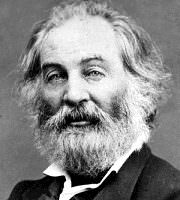About Walt Whitman
Walter Whitman, better known as Walt Whitman, was born May 31, 1819, in West Hills, New York (Long Island) and died March 26, 1892, in Camden, New Jersey. He was an American poet, novelist, journalist, and publisher. His collection of poems, Leaves of Grass, is considered his masterpiece. The first edition of this book was self-published in 1855, the same year Whitman's father died. At that time, the collection consisted of twelve long, untitled poems. There was little or no public reaction or criticism. A year later, Whitman published a second edition, which included a congratulatory letter from Ralph Waldo Emerson and twenty additional poems. Emerson had long called for the emergence of an American poetry free from European influence; Leaves of Grass filled this need. By its sixth edition in 1881, the collection of poems had grown thicker. Whitman enjoyed a greater reputation by then, and the edition sold a large number of copies, which enabled Whitman to buy a mansion in Camden, New Jersey. His best poems include “Song of Myself”, a long iconic poem celebrating individuality, nature, and the universal connection between all beings, and “O Captain! My Captain!”, a poignant tribute to Abraham Lincoln after his assassination, often studied for its moving tone and symbolism. Among his other most famous poems are “When Lilacs Last in the Dooryard Bloom'd”, another elegiac poem dedicated to Lincoln; “I Sing the Body Electric”, a celebration of the human body and its beauty, reflecting Whitman's transcendentalist vision, and “Crossing Brooklyn Ferry”, a meditative poem about time, space, and the connection between generations.For many, Walt Whitman and Emily Dickinson are the two pillars of 19th century American poetry. In particular, Whitman's poetry feels inherently American. The poet evokes an ordinary America in a resolutely American voice. The strength of his poetry seems to come from the lively emotions he arouses thanks to the intelligence of his words. Whitman uses repetition to create a hypnotic character in his lyrics: this repetition creates the strength of his poetry, which inspires rather than informs. So it is better to read his poetry aloud to feel the full message. Its poetic qualities partly derive their ancestry from religious or quasi-religious speeches and writings, such as those of the poet James Weldon Johnson. Twentieth-century (and now twenty-first) American poets cannot ignore Whitman in that he fundamentally defined the poetic language of democratic America.
Whitman, throughout his life, will be a convinced democrat; he was the general secretary of the Democratic Party of New York. Opposed to slavery, he left the Democratic Party to join the Free Soil Party.
Whitman died of pneumonia on March 26, 1892, after completing the revision of Leaves of Grass. Among the causes of his death is incriminated a diet based on dairy products, in particular the milk punch. At the time, the milk was often tampered with plaster, and the health of the dairy cows was not checked; thus, it seems that Walt Whitman consumed milk from cows with tuberculosis. Whitman is buried in Harleigh Cemetery, Camden, New Jersey, alongside members of his family in a hillside crypt he designed.
Browse all poems and texts published on Walt Whitman
The United States themselves are essentially the greatest poem.









